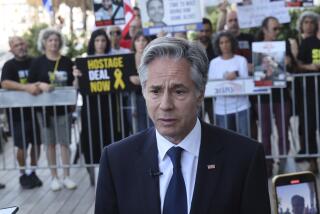AFTERMATH OF THE TOWER REPORT : Proposal Received Reagan’s Approval but Was Shelved : North Pushed Plan to Rescue Hostages
WASHINGTON — White House aides, complaining that top Pentagon officials “refused to go beyond the initial thinking stage,” enlisted a retired Air Force general and an ex-Israeli official to plan an attempt to rescue American hostages in Lebanon, according to the Tower Commission report.
The investigative panel, in findings released Thursday, said President Reagan last June 6 approved “military planning to rescue the hostages.” The report gave no details, but indicated nothing came of the rescue hopes because of an inability to pinpoint the captives’ locations.
References to the involvement of the retired general, Richard V. Secord, and the former Israeli intelligence officer, Amiram Nir, were made in a computerized message by Lt. Col. Oliver L. North. The message was among hundreds obtained by the commission from White House communications system records.
Close Ties With Secord
North, who was fired from the National Security Council staff last fall, worked closely with Secord in both of the Iranian arms sales and the covert shipment of arms to the Nicaraguan contras , and had extensive contacts with Nir in the Iranian operation.
In a June 3 computer message to Vice Adm. John M. Poindexter, then Reagan’s national security adviser, North said he agreed with the view expressed by Poindexter in a message to him four days earlier that “we need to seriously think about a rescue effort for the hostages.”
But North said that such a mission should be considered only if “the current effort fails”--a reference to the arms shipments to Iran that were then secretly under way. Referring to the United States’ past failures in rescuing hostages, he added: “You will recall that we have not had much success with this kind of endeavor in the past.”
Criticizes CIA
North’s message then criticized an unspecified “effort” by the CIA and referred to Peter Kilburn, an American hostage who was found shot to death April 17, 1986, near Beirut shortly after U.S. planes bombed Libya. It also referred to “Copp,” one of his code names for Secord and to an attempt by U.S. drug agents to infiltrate the Druze militia in Lebanon.
It said: “After CIA took so long to organize and then botched the Kilburn effort, Copp undertook to see what could be done thru one of the earlier DEA (Drug Enforcement Administration) developed Druze contacts. Dick (apparently a reference to Secord) has been working with Nir (the Israeli) on this and now has three people in Beirut and a 40-man Druze force working ‘for’ us. Dick rates the possibility of success on this operation as 30%, but that’s better than nothing.”
North then referred to the Joint Chiefs of Staff, the top military commanders at the Pentagon. “In regard to U.S. military rescue ops, JCS has steadfastly refused to go beyond the initial thinking stage unless we can develop some hard intelligence on their whereabouts,” he told Poindexter.
Suggests Operation Plan
“If we really are serious,” North continued, “we should start by getting CIA to put a full-time analyst on the HLTF (Hostage Location Task Force) and then organizing a cell--preferably not in the Pentagon but at CIA, to put the operation together.”
Then, referring again to Secord and his role in a never-executed plan to try to rescue the diplomats and other hostages held at the U.S. Embassy in Tehran in 1980, North said: “Dick, who has been in Beirut, and who organized the second Iran mission, is convinced that such an operation indeed could be conducted.”
Three days after this message, the report said White House logs showed Reagan “approved military planning to rescue the hostages as well as reviving (previously planned efforts).” On June 19, Poindexter asked CIA Director William J. Casey “to intensify efforts to locate the hostages,” the commission said. And, six days later, North told Poindexter, “You should also be aware that CIA believes that they have made a major breakthrough on the location of at least two of the hostages.”
Generates New Enthusiasm
This information, he said, was being carefully analyzed before being passed on to other U.S. agencies “but there hasn’t been this much enthusiasm on the issue in a long time.”
The commission, referring to later North message to Poindexter, said “by July, the United States had asked Israel to help.”
But the hopes and enthusiasm for a rescue mission apparently came to naught. The only subsequent mention in the commission report of hostage rescue plans was a cryptic statement that Reagan “considered . . . the possibility of a rescue operation at his morning briefing (by NSC officials) on September 9.”
More to Read
Sign up for Essential California
The most important California stories and recommendations in your inbox every morning.
You may occasionally receive promotional content from the Los Angeles Times.










